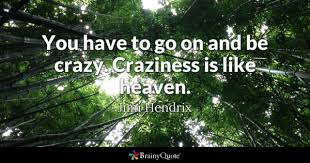“How’s business?” someone asked me at a party recently.
I responded with my standard (and true) answer: that I’m happy in my work, and happy that I get to do it. Then came the joking next question, “So I guess there must be at least as many crazy people around these parts as there are in the city?”
It was a version of the reference to “crazy people” in connection with the work I do that I have heard more times than I can count, and yet it takes me off guard every time, since “crazy” is not a way I think of anyone I see or have seen in my therapy practice. It’s as if someone were to ask me, “Are there as many two-headed green space aliens around these parts as there are in the city?” To which my answer would be easy: “I wouldn’t know— I’ve never seen any.”

The fact is, the term “crazy” says more about the fear and judgement of those who use it than it says about anyone it is used to describe. Think about it: when you have described yourself or someone else as being “crazy,” haven’t you used it as a term of scorn, a shorthand way to judge, write off, and distance yourself from someone you see as not being able to cope as you think they should, or whose behaviors annoy you, or who seems eccentric in a way you fear?
Which is not to say that there are not people who don’t suffer terribly and persistently from disabling, disorienting, mental or emotional conditions (conditions which are usually treated with medication and case-management anyway, and not counseling). But to call people with severe and persistent mental illness “crazy” is to replace our compassion and curiosity with an all-purpose, scornful write-off label that only contributes to the stigma and isolation that they live with everyday, adding insult to injury, very literally.
Far from being either “crazy” (whatever that means) or being two-headed green space aliens, the people who go to therapy are just like you and me: humans grappling with the ordinary and sometimes extraordinary challenges of being human. Some are dealing with mental illness, which (like any other illness) takes a lot of energy and patience and skill to cope with on a daily basis. Some, faced with a difficult decision, life transition, or loss to navigate, use counseling to create a space in which to hear themselves think and feel themselves feel, the better to figure out for themselves what to do. And the purpose of counseling is to hold that space– a space for people to have a conversation with their own wisdom and emotions, not to get advice, have their problems solved by someone else, or be told how they “should” feel (our friends and families are happy to do that for free, right?)
Over the past several decades of my own adult life, I have personally seen a therapist on 4 different occasions at least, and each therapist I consulted was invaluable in helping me identify and effectively navigate the particular challenges I was working with at the time. One helped me see the need to develop more self-compassion, and taught me practices to cultivate it which I use and teach to this day. One helped my husband and me endure the challenges of parenting teens more effectively (and I hope more gracefully). Another offered me the kinds of questions to ask myself that made it possible for me to more clearly evaluate and take action on a difficult workplace situation. And one offered simply the anchor of her calm, reassuring, confident, listening presence that I needed to get myself through a scary episode of depression, until it lifted.
Could I cope with these myself without counseling? Of course— I was coping, just like everyone alive is coping: coping is what keeps us alive. The problem for most of us isn’t located in a failure of “coping,” it’s that “coping” alone reduces our experience of living to strategies focused on avoiding pain, at the expense of feeling fully and exuberantly alive. So when people come to therapy, it’s rarely about not being able to cope; it’s about being tired of paying the price of “just coping,” and wanting to also feel more fully (and joyously) alive.
Which makes me think, as I write this, that maybe that is actually a good definition of “crazy:” “being fully alive.” If that makes me crazy, I’ll take it. I’d be crazy not to.

One reply on “Crazy”
Very well put!! Thank you
LikeLike